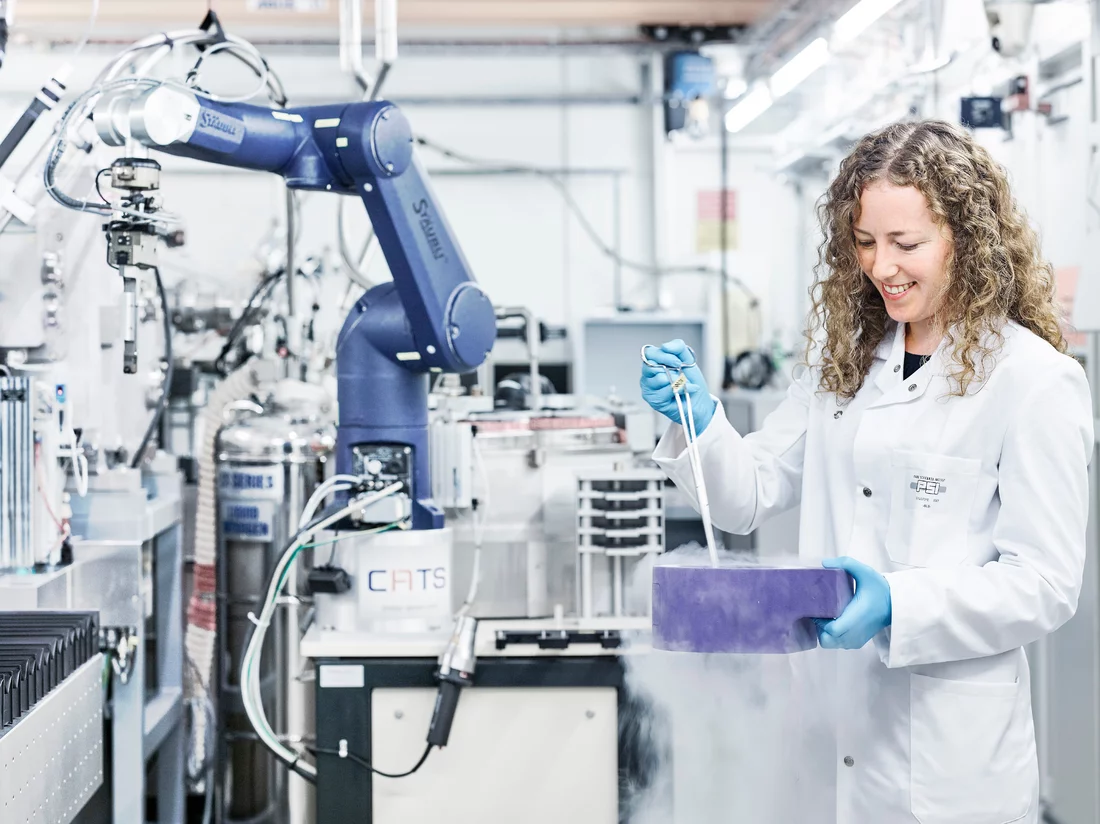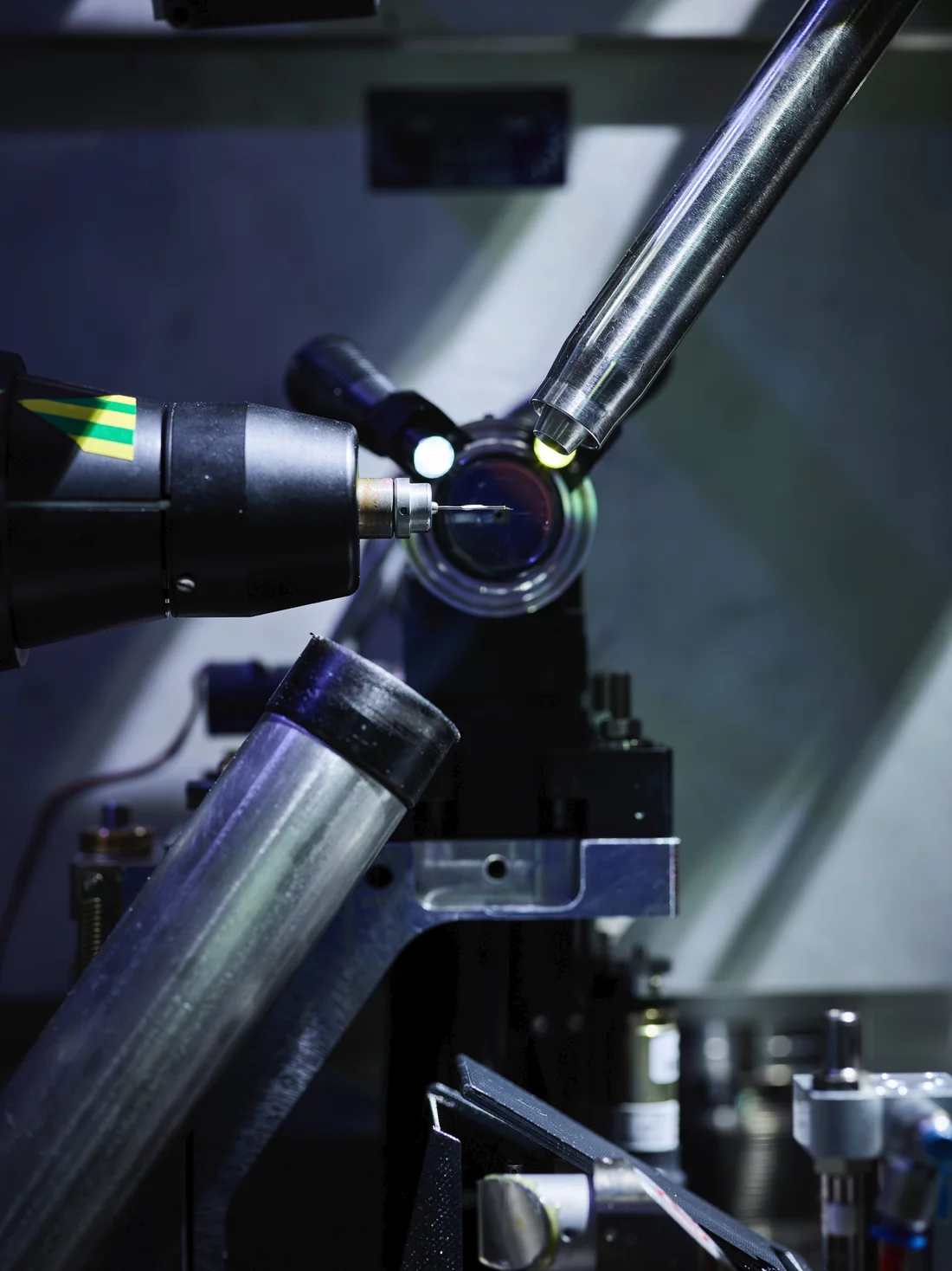Frankfurt scientists identify a possible Achilles’ heel of SARS-CoV-2 virus. This means a potential drug target to treat Covid-19. The researchers carried out part of their measurements at the Swiss Light Source SLS at the Paul Scherrer Institute PSI. This week, the research results are published in the scientific journal Nature.
When the SARS-CoV-2 virus penetrates human cells, it lets the human host cell produce proteins for it. One of these viral proteins, called PLpro, is essential for the replication and rapid spread of the virus. An international team of researchers led by Goethe University and University Hospital Frankfurt has now discovered that the pharmacological inhibition of this viral enzyme not only blocks virus replication but also strengthens the anti-viral immune response at the same time. In other words, if the protein is blocked with the help of drugs, the virus will probably no longer be able to reproduce in human cells. In addition, the human body may then be able to defend itself against the virus on its own.
“Double strike” against Coronavirus
In the case of an infection, SARS-CoV-2 must overcome various defense mechanisms of the human body, including its non-specific or innate immune defense. During this process, infected body cells release messenger substances known as type 1 interferons. These attract natural killer cells, which kill the infected cells.
One of the reasons the SARS-CoV-2 virus is so successful – and thus dangerous – is that it can suppress the non-specific immune response. In addition, it lets the human cell produce the viral protein PLpro (papain-like protease). PLpro has two functions: It plays a role in the maturation and release of new viral particles, and it suppresses the development of type 1 interferons. The researchers including Ivan Đikić, last author of the paper, have now been able to monitor these processes in cell culture experiments. Moreover, if they blocked PLpro, virus production was inhibited and the innate immune response of the human cells was strengthened at the same time.
Sandra Ciesek, Director of the Institute of Medical Virology at University Hospital Frankfurt, explains that the papain-like protease is an extremely attractive anti-viral goal for her as a physician because its inhibition would be a “double strike” against SARS-CoV-2.
More insight with synchrotron radiation
The Frankfurt researchers carried out their measurements to decipher the protein’s crystal structure at PSI’s Swiss Light Source SLS. "We shoot crystals with X-rays," explains May Sharpe, crystallographer at PSI’s Laboratory for Macromolecules and Bioimaging. "This makes it possible to study proteins in atomic detail." If the exact structure of viral components is known, reasearcher can more easily develop drugs against the pathogen.
Deciphering the structure of proteins down to the level of individual atoms is a PSI speciality. A measurement only takes about three minutes per sample. For many years, three experimental stations at the MX beamlines have been set up for the purpose of analysing protein crystals.
Since the beginning of the pandemic, measurements related to Covid-19 have been given priority at SLS. In March, PSI had called for proposals to enable rapid access for beamtime. Donghyuk Shin from Frankfurt University was the first scientist to apply, says Sharpe. Shin's proposal was also the reason why PSI decided to cancel the shutdown, originally planned over the Easter holidays. Within two days, Shin's request for beamtime was granted — in record time.
Measurements themselves are now carried out 100 percent by remote control, May Sharpe adds. To this end, a robot arm mounts the samples onto the measuring station at SLS. "The researchers send their crystals by courier service, we load the station with them and the measurements are performed remotely." The Frankfurt researchers therefore did not have to come to PSI themselves – a great advantage during a pandemic.
Based on a media release from Goethe University Frankfurt with additions from the Paul Scherrer Institute/Brigitte Osterath
Contact
Dr. May Elizabeth Sharpe
Group Leader MX samples
Laboratory of Macromolecules and Bioimaging
Paul Scherrer Institute, Forschungsstrasse 111, 5232 Villigen PSI, Switzerland
Telephone: +41 56 310 54 37, e-mail: may.sharpe@psi.ch [English]
Professor Ivan Đikić
Director of the Institute of Biochemistry II of University Hospital Frankfurt and Group Leader at the Buchmann Institute for Molecular Life Sciences
Telephone: +49 69 6301 59 64, e-mail: dikic@biochem2.uni-frankfurt.de
Further information
Original publication
Papain-like protease regulates SARS-CoV-2 viral spread and innate immunity
D. Shin, R. Mukherjee, D. Grewe, D. Bojkova, K. Baek, A. Bhattacharya, L. Schulz, M. Widera, A. R. Mehdipour, G. Tascher, K.-P. Knobeloch, K. Rajalingam, H. Ovaa, B. Schulman, J. Cinatl, G. Hummer, S. Ciesek, I. Dikic
Nature, 29. July 2020 (online)
DOI: 10.1038/s41586-020-2601-5


